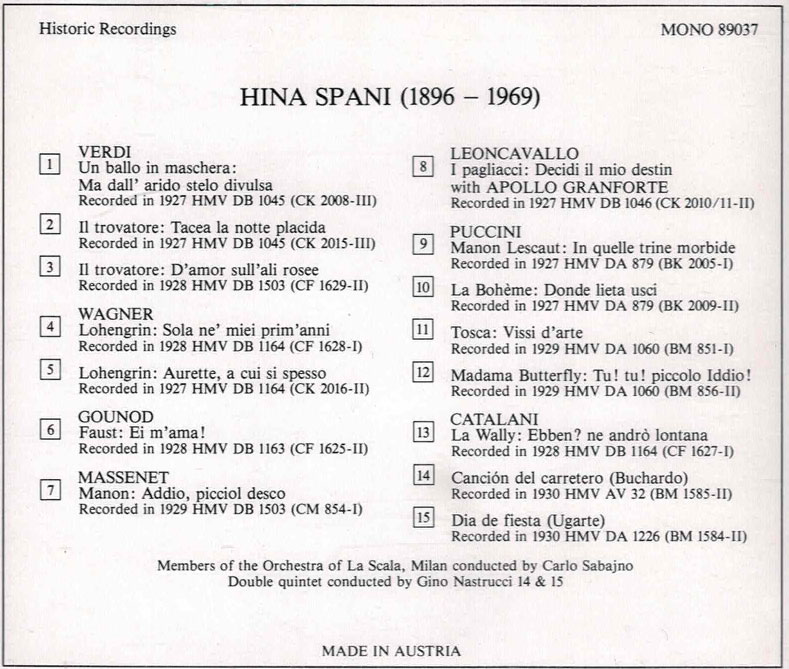Logowanie
Dlaczego wszystkjie inne nie brzmią tak jak te?
Chai Lang, Fan Tao, Broadcasting Chinese Orchestra
Illusive Butterfly
Butterly - motyl - to sekret i tajemnica muzyki chińskiej.
SpeakersCorner - OSTATNIE!!!!
RAVEL, DEBUSSY, Paul Paray, Detroit Symphony Orchestra
Prelude a l'Apres-midi d'un faune / Petite Suite / Valses nobles et sentimentales / Le Tombeau de Couperin
Samozapłon gwarantowany - Himalaje sztuki audiofilskiej
PROKOFIEV, Stanislaw Skrowaczewski, Minneapolis Symphony Orchestra
Romeo and Juliet
Stanisław Skrowaczewski,
✟ 22-02-2017
BARTOK, Antal Dorati, Philharmonia Hungarica
Dance Suite / Two Portraits / Two Excerpts From 'Mikrokosmos'
Samozapłon gwarantowany - Himalaje sztuki audiofilskiej
ENESCU, LISZT, Antal Dorati, The London Symphony Orchestra
Two Roumanian Rhapsodies / Hungarian Rhapsody Nos. 2 & 3
Samozapłon gwarantowany - Himalaje sztuki audiofilskiej
Winylowy niezbędnik
ClearAudio
Cartridge Alignment Gauge - uniwersalny przyrząd do ustawiania geometrii wkładki i ramienia
Jedyny na rynku, tak wszechstronny i właściwy do każdego typu gramofonu!
ClearAudio
Harmo-nicer - nie tylko mata gramofonowa
Najlepsze rozwiązania leżą tuż obok
IDEALNA MATA ANTYPOŚLIZGOWA I ANTYWIBRACYJNA.
Wzorcowe
Carmen Gomes
Celebrating the art and spirit of music - vol. 5 - Reference Songs
- CHCECIE TO WIERZCIE, CHCECIE - NIE WIERZCIE, ALE TO NIE JEST ZŁUDZENIE!!!
Petra Rosa, Eddie C.
Celebrating the art and spirit of music - vol. 3 - Pure
warm sophisticated voice...
SAMPLER - STS DIGITAL, Gregor Hamilton
Celebrating the art and spirit of music - vol. 2 - Love songs from Gregor Hamilton
...jak opanować serca bicie?...
SAMPLER - STS DIGITAL
Celebrating the art and spirit of music - vol. 1 - Leonardo Amuedo
Największy romans sopranu z głębokim basem... wiosennym
Lils Mackintosh
Celebrating the art and spirit of music - vol. 4 - A Tribute to Billie Holiday
Uczennica godna swej Mistrzyni
VERDI, PUCCINI, GOUNOD, CATALANI
Hina Spani

- VERDI
- PUCCINI
- GOUNOD
- CATALANI
Lebendige Vergangenheit
These records of Hina Spani are surely as fine a sequence as any made by a comparable soprano in the interwar years. No doubt the personal factor comes into play, for I find that it is singing I become rather possessive about, feeling it to be in some way 'mine'; yet this is also a factor in any lifelong fascination with the singing-voice. Listening (reluctantly) as through the ears of others I can imagine that the vibrato might be found obtrusive, whereas for myself it is one of the conditions of the emotional and dramatic power: interesting to note, too, how she uses it to maximum effect in the Catalani aria and hardly at all in Elsa's song to the breezes. What I particularly love is the ever-sensitive shading of phrases, the chiaroscuro—you hear it in the Trovatore arias, for example, where tenderness and tension are magically alternated. One wonders how powerful a voice it was. She was a lyric-dramatic soprano whose roles included Aida, Sieglinde and Turandot, but she also appears to have had uncommonly fine artistic judgement in the gradation of volume (the Ballo in maschera aria is a superb example) and to have sung at a steady forte far less than many one can think of. It is also notable that her 1927 recordings, perhaps experimentally for their time, have the orchestra relatively forward in the balance, and the whole thing given a more spacious ambience than was usual. The originals tend to be difficult to play well, having been made in those years when a rough and noisy kind of shellac was in use. The Preiser transfers cope very well and the occasional scrunchy passage scarcely affects the voice. The disc is highly recommendable, but worth a pause for thought is the two-disc Club 99 issue (9/90) which is virtually a complete edition, including the rest of the songs (making 14 in all), the Otello duet with Zenatello, and the rare-to-virtually-unknown early American Columbias.' https://www.gramophone.co.uk/review/hina-spani-1896-1969
























